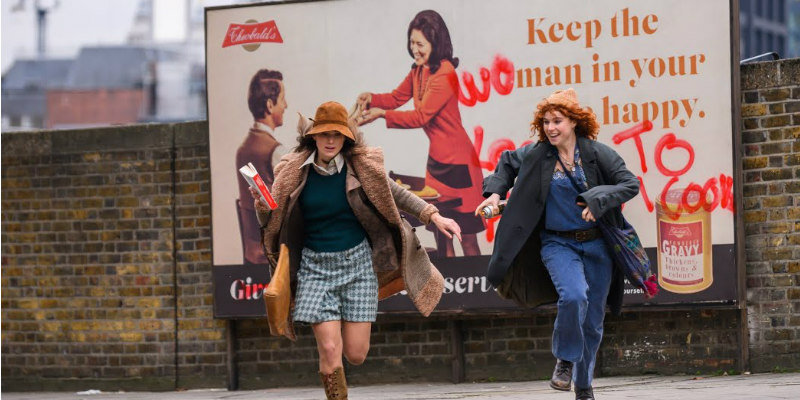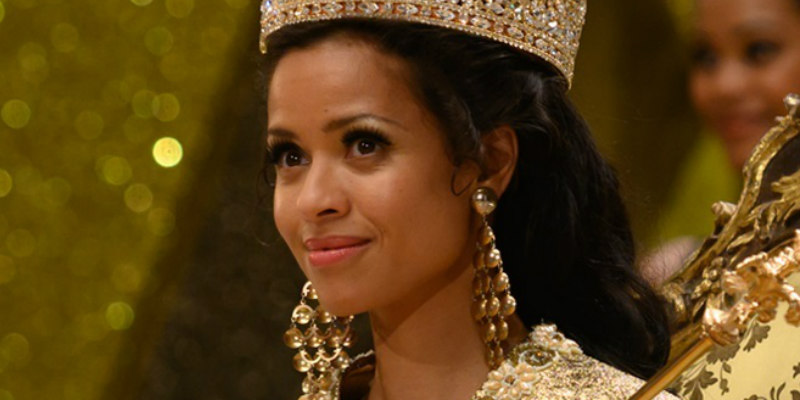
At the 1970 Miss World pageant, various parties compete for the
spotlight.
Review by
Eric Hillis
Directed by: Philippa Lowthorpe
Starring: Keira Knightley, Gugu Mbatha-Raw, Jessie Buckley,
Keeley Hawes, Phyllis Logan, Lesley Manville, Rhys Ifans, Greg Kinnear

The Miss World pageant is one of those things you might stumble across once a year on page 17 of a tabloid or see mentioned on social media, provoking a reaction along the lines of "Oh, is that still a thing?" That wasn't always the case. The Superbowl of swimsuits was once a TV event on the scale of not just the Superbowl itself, but the World Cup Final. Baffling as it now seems, in 1969 more viewers tuned in to watch the Miss World final than the moon landing!
With racier swimsuits than ever before, Miss World was at its peak in the late '60s and early '70s, and in 1970 the finals were staged in a London that found itself nursing a societal hangover from the distraction of the swinging sixties, with a generation of young people becoming politically engaged in such causes as women's liberation, ending apartheid, protesting the war in Vietnam and general disruption of the status quo. The Miss World pageant suddenly found itself a political hot potato, dogged by accusations not just of sexism, but racism, given its preference for women of white European heritage.

Director Philippa Lowthorpe's Misbehaviour is an ambitious attempt to explore the various parties involved in the cause of both promoting and disrupting the contest. Unfortunately it's a bit like a beauty pageant itself, with various perspectives jostling for the spotlight, and all ultimately receiving superficial treatment.
Misbehaviour is over-populated by a host of key players. Sally Alexander (Keira Knightley) is a mature student at University College London who grows frustrated at how her voice as a woman is pushed aside by her fellow male students and lecturers, but she reasons that the best way to dismantle the patriarchy is to quietly infiltrate it. On the other end of the feminist scale is Jo Robinson (Jessie Buckley), leader of a local chapter of the Women's Liberation Movement, favouring a more aggressive approach of protests and vandalism. When the two cross paths, Sally is emboldened by Robinson's spirit, while Jo is influenced by Sally to think a little more strategically about her tactics. Together, the two devise a plan to infiltrate the Miss World pageant and stage a protest in front of the millions watching on TV across the world.
[ READ MORE: New Release Review - Irena's Vow ]
Fighting a social battle of her own is Jennifer Hosten (Gugu Mbatha-Raw), who arrives in London to represent the Caribbean nation of Grenada at the pageant. She harbours hopes of becoming the first ever black Miss World, and as such she embraces the pageant fully. In one scene we watch as she sneaks onto the stage late at night to practice her walk, beaming her smile at a non-existent audience. In the days leading up to the final, Jennifer befriends Pearl Jansen (Loreece Harrison), the first black South African allowed by her government to compete for the Miss World title, though she's arrived alongside a white South African representative and is condescendingly given the title of Miss Africa South.

There are two struggles in motion here, one for gender equality and one for racial equality, but you get the sense that the film views the latter as an unfortunate inconvenience, a stick in the spokes of a more straightforward story of women vs men that the white women filmmakers would rather they could spin. At one point, Sally and Jennifer find themselves together in a bathroom in the aftermath of the former's disruption of the latter's victory. It's a potentially fascinating and loaded confrontation, as a privileged white woman's celebrations over her strike against the system are cut short when she realises she's stolen the spotlight from a black woman's achievement. Knightley and Mbatha-Raw play the scene very convincingly, but as this is really just a middle of the road "let's form a gang and have some fun" comedy of the sort the British film industry has been overly reliant on since the success of The Full Monty, it's no surprise that the film never sinks its teeth into the complex "equality, but for whom?" dynamic at its heart.
[ READ MORE: New Release Review - Gator Creek ]
That scene might be called a draw, with both women presenting their points of view, but the film itself leaves you in no doubt as to which struggle it deems more important. Mbatha-Raw's Jennifer and Harrison's Pearl are largely sidelined, given far less screen time than Knightley's Sally and Buckley's Jo, and even Miss Sweden (Clara Rosager) is granted a puzzling amount of the spotlight, despite her not winning the tournament and her character arc ultimately leading nowhere. As the film ends, a title card appears with a reference to how women are still battling to end the patriarchy, yet no such card is granted to the continuing struggles of black people. Perhaps Misbehaviour is a story that should have been told by a black woman filmmaker, who might better balance the film's dual and duelling perspectives?

A more satisfying version of this story would be a three hour ensemble epic that does for Miss World what Robert Altman's Nashville did for the country music industry (think a more politically charged version of Michael Ritchie's Smile). As it stands, Misbehaviour attempts to cram too many characters into its 106 minutes. Played unconvincingly by Greg Kinnear, comedian Bob Hope, who hosted the final that year, serves no real purpose other than to represent male chauvinism, and his screen time would have been put to better use if occupied by Miss Grenada. Lesley Manville is given a largely thankless role as his wife, though she does express more with one crooked smile than some of the other characters do with their dialogue. Rhys Ifans and Keeley Hawes share an intriguing dynamic as the Morleys, the husband and wife team behind the tournament, but their time on screen is too limited to explore their relationship satisfyingly.
Like so many of these British comedy-dramas, Misbehaviour boasts some stellar performances (Mbatha-Raw and Buckley are standouts, while Knightley is the glue that holds it all together), will provoke a few chortles, and offers the odd moment of pathos. But ultimately it leaves you yearning for another (documentary?) film that might better explore its subject and setting.

Misbehaviour is on Netflix UK/ROI
now.
